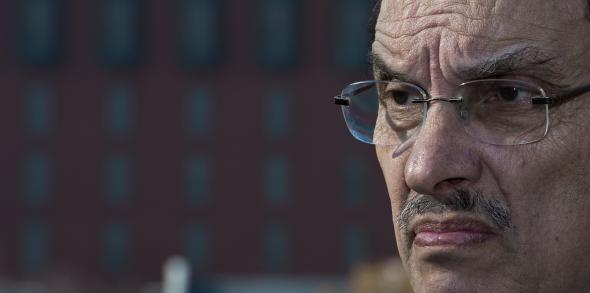Why Did Nobody Care Enough to Vote for D.C.’s Mayor?

Photo by Paul J. Richards/AFP/Getty Images
Howard Kurtz, who was the Washington Post's media reporter for a generation, judges its coverage of the D.C. mayoral primary. He finds it wanting. "The Washington Post editorial page has most likely made Muriel Bowser the next mayor of the District of Columbia," he writes, referring to the daily's endorsement of the councilwoman-turned-nominee. "Unfortunately, the Washington Post news pages failed to tell us very much about her ... in the final two weeks, the paper never ran a full-scale examination of her record."
This might be a little unfair to the Post. Bowser had gotten plenty of coverage in the paper. Mike DeBonis, the paper's fantastic local politics beat reporter, profiled her a month before the polls closed and a week before Mayor Vincent Gray was hit by the scandal that smothered any chance of momentum. Weeks earlier Melinda Henneberger, one of the Post's many roving political writers, walked the campaign trail with Bowser. If you expand the voters' options, and consider what else he/she might have read before voting the City Paper put Bowser on the cover ("Muriel's Vetting") a full year before the primary.
But back to the Post. Yes, the paper endorsed Bowser a full six weeks before the primary, before the aforementioned DeBonis piece (not to mention some profiles of the surging candidate) ran. Anyone who read past the headline saw an endorsement that struggled to fill a paragraph with Bowser's accomplishments ("she has been a thoughtful and pragmatic lawmaker who tries to identify problems before formulating solutions") and suggested that Gray would have deserved another term "if this were an ordinary election year." The Post had twice endorsed Bowser's mentor, Adrian Fenty; it had broken story after story about the ethics fallout from Gray's 2010 campaign.
So there are sore feelings about Gray's loss, which has been blamed alternately on the U.S. attorney's case and the Post's reporting. DeBonis has even followed up with a post about how Gray was in trouble before the mid-March hit from the U.S. attorney. In other cities—Philadelphia's 2003 mayoral race comes to mind—voters who were angry about the way a mayor was being treated by the press and the feds rose up to re-elect him. In D.C., Gray's vote simply failed to show up.
The pathetic turnout numbers tell that story. Only 22.5 percent of D.C.'s registered voters turned out for the election, down from 37.1 percent in 2010. Only 35,899 Democrats voted for Muriel Bowser—that's far fewer than the 59,524 who voted for Fenty in 2010, when he lost. There was a path to victory for Gray, but in his strongest wards, turnout collapsed. In 2010 Gray racked up 14,518 votes in Ward 7 and 10,502 votes in Ward 8, represented by council members Yvette Alexander and Marion Barry, both of whom endorsed him. In 2014 Gray won 4,831 votes in Ward 7 and 3,058 votes in Ward 8. Across those wards, Bowser actually won fewer votes than Fenty had. But in 2010 turnout was 36.8 percent in Ward 7. This year it was 16.5 percent. In Ward 8 turnout tumbled from 31.4 percent to 11.5 percent.
Gray could have won. Nothing was stopping voters from learning more about Bowser or showing up to cast a backlash vote against Gray's inquisitors. D.C. Democrats chose to fall asleep, delivering the worst turnout in the 40-year history of mayoral primaries.
